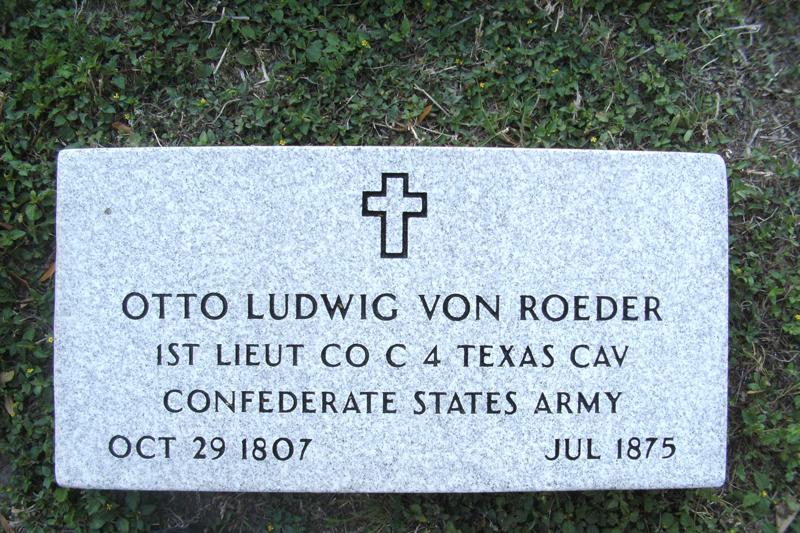Otto von Roeder
Interment source:
Eli T. Merriman article
and
The History and Heritage of Victoria County, Vol. 2, p. 849, by the Victoria County Genealogical Society.

Photo Credit: Rosa G. Gonzales
1. Reference in article about Nassau Farm
2. Biographical information
Friedrich Arnold Otto Ludwig von Roeder, the son of Lt. Ludwig Sigismund Anton von Roeder, feudal land baron and Prussian military officer, and is wife Caroline Luise Sack, was born October 29, 1807, near Hoexter, Westphalia. He was the fourth of seven sons and the sixth child of 11 siblings who grew to maturity. Wealthy, privileged, proud, and highly educated, he studied law at Heidelberg and Goettingen Universities. In November 1833 he had passed his examinations and was awaiting nomination as a court attorney. However, his fortune and that of his family changed drastically when he was charged with killing a lieutenant in the Pressian Army and sentenced to ten years’ imprisonment. Because of his father’s position, he was pardoned but banished from his homeland.
The family heard of the vast acreage available in Texas and decided the political turmoil following the fall of Napoleon, the taxes being levied on estates, rapidly dwindling numbers of peasants to toil the land, and poor prices paid for crops merited a change for all of them. They sold out, sent three sons and a daughter ahead in March 1834 to make a land claim, and then followed on September 20 that year. On August 20, in Breden, Otto married Pauline von Donop, a daughter of Anton and Antoinette von Schade von Donop of Woebel near Detmold.
Texas was not very welcoming. Their ship ran aground at Galveston on December 22, badly damaging their belongings. They found one brother and the sister had died of yellow fever near their claim at Cat Spring in Stephen F. Austin’s colony. They, who always had someone to do their work for them, had no personal experience in producing crops, and the Texas Revolution was already in its preliminary stages. Although sources say that Otto served in the Texas Army, he was not rewarded with a land grant for such service. His wife died later in 1836 at Galveston following the Battle of San Jacinto, leaving him with an infant son.
Resettling following the war, Otto built a mill on a tributary to Mill Creek near the present-day town of Shelby in Austin County. Organization of the Society for the Protection of German Immigrants to Texas in 1842 brought him many customers who could not pay him for grinding their grain. These services he charged to the Society, which had brought a large property, Nassau Plantation, near present-day Round Top in Fayette County. The financially strapped Society was forced to concede the property to him, of which he then sold half. The courts decided the Society, which had never been incorporated in Texas or in Germany, could not own property; therefore the transactions were illegal. He fought the decision.
On January 5, 1845, Otto married his widowed first cousin, Adolphine Auguste Theodore Ploeger Sack. Later described as a beautiful and cultured woman and a wonderfully kind man by their neighbor, Amanda Fallier von Rosenberg, the couple had scandalized his brother-in-law, Ferdinand Engelking, by openly living together for some months before marry.
While Nassau Plantation was tied up in litigation, Otto moved south and developed a “princely plantation� on the banks of the Guadalupe River in Victoria County’s Mission Valley. His family grew to eight children, and he was listed on the 1860 census, as one of the areas most prominent and prosperous citizens. A year later at 54, when the civil War began, the well known patriot joined Company A of Victoria’s reserves, the “Blues� as an officer. On November 24, 1863, Col. von Roeder was captured while the company was defending Mustang Island. Praised for his kindness to other prisoners, he was released at New Orleans in June 1864 following the Louisiana Red River Campaign in which his eldest son served as an officer.
The South’s defeat was also his. The Supreme Court ruled against his claim to Nassau Plantation and he lost his Victoria holdings; his family split up; and in contrast to his 1860 status, the 1870 census listed him as a sheep farmer near Banquete in Nueces County. Broken in spirit and fortune, he died quite suddenly the 1st week of July 1875. However, as a tribute to him, he was given a funeral with military honors attended by six of his Victorian cronies. He was buried in the Old Bay View Cemetery in Corpus Christi. There is no tombstone to mark his grave.
Survived by son Ludwig of Pettus, step-daughter Adolphine Sack Clark of Banquete, Daughter Caroline Curtis of Brackettville, and sons Arnold, George W., and Otto von Roeder, he left behind a legacy of contrasts I character, complexity, and colorful actions that neither his descendants nor those of his siblings have equaled.
By Flora von Roeder
Source:
Victoria County Genealogical Society. The History and Heritage of Victoria County, vol. 2. Austin: Nortex Press, 2000
Research by: Msgr. Michael A. Howell
Transcription by: Geraldine D. McGloin, Nueces County Historical Commission